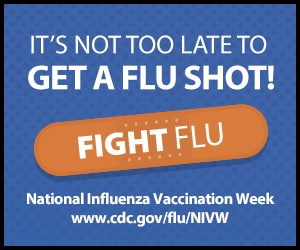Each year, the Centers for Disease control recommends that all healthy people ages 6 months and older get their annual influenza vaccines as early into the season as possible.
For this 2016-2017 influenza season, there is one important change: everyone should get the injectable form instead of the live nasal mist vaccine which may not be as effective.
 |
| Source: http://philcoiinetnetau.blogspot.com/2011_03_01_archive.html |
Influenza can be deadly for everyone but especially for children, older adults and those who are immunocompromised. The CDC estimates that about 114,000 people are hospitalized each year for influenza.
It’s very challenging to determine the number of deaths which may be attributed to influenza but the CDC estimates CDC estimates that the number of influenza-related deaths can range from as low as 3,000 to as high as 49,000 people each influenza season.
The annual influenza season typically begins around October but varies based on the first reported cases of influenza. During most influenza seasons, flu activity generally peaks between December and March. During some seasons, positive cases of influenza have continued as late as May.
To build immunity before flu season peaks in the winter, the CDC recommends that flu vaccines be offered as early as possible and flu vaccines are generally available in late August or early September.
 Some people worry that if they get the flu vaccine too early into the season that it won’t be effective for the duration of the season. For most healthy adults under age 65, getting the vaccine as early as possible helps to ensure your immune system has time to build an adequate response and that your protection lasts throughout the flu season.
Some people worry that if they get the flu vaccine too early into the season that it won’t be effective for the duration of the season. For most healthy adults under age 65, getting the vaccine as early as possible helps to ensure your immune system has time to build an adequate response and that your protection lasts throughout the flu season.
For older adults above the age of 65, their immunity to the flu vaccine may start to decrease throughout the season so FLUAD, a higher dose vaccine with an added adjuvant to enhance the immune response, is recommended for this age group.
It’s especially important that healthcare workers and anyone who works closely with young children or young adults get their annual flu vaccines to ensure that we don’t inadvertently contract influenza and spread it to these vulnerable populations.
 As a Registered Nurse, I provide care for many adults whose immune systems are compromised due to current infections or diseases such as COPD, diabetes and cardiac dysfunction. I got my flu vaccine at work early September, and of course, I took my third annual FluShotSelfie since I’ve become a nurse. I always encourage my coworkers to get their flu vaccines as early as possible and encourage them to post their vaccine selfies as well.
As a Registered Nurse, I provide care for many adults whose immune systems are compromised due to current infections or diseases such as COPD, diabetes and cardiac dysfunction. I got my flu vaccine at work early September, and of course, I took my third annual FluShotSelfie since I’ve become a nurse. I always encourage my coworkers to get their flu vaccines as early as possible and encourage them to post their vaccine selfies as well.
I offer the flu vaccine to each and every one of my eligible patients and offer education to them when they are feeling hesitant or unsure about whether they actually need the vaccine. “Are you alive?” I jokingly ask my patients. When they reply, “yes,” I always smile and tell them that the flu vaccine is definitely for them, then!
Whether you’re working with patients or not, getting a flu vaccine each year is a fantastic way to protect yourselves, your families and your communities!
If you do choose to get your flu shot, be sure to share it with us or post a picture to your social media accounts and use the following hashtags:




